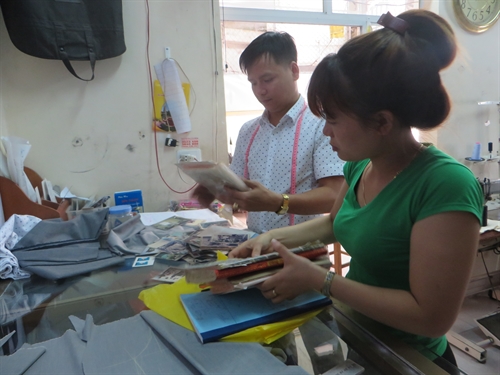 Features
Features

With dressmaking skills Phúc Danh has become more mature, overcoming his deafness to have more confidence in himself. He has also helped three other people with similar disabilities to earn a living.
 |
| Entrepreneur: Phúc Danh runs the dressmaking shop to make ends meet and to help people with similar backgrounds sustain their lives. |
With dressmaking skills Phúc Danh has become more mature, overcoming his deafness to have more confidence in himself. He has also helped three other people with similar disabilities to earn a living.
By Đàm Quỳnh Ngọc
In a small alley, there is a neat and tidy house. Fabric and clothes customers have ordered hang on the wall. Pictures of a school, classmates, and favorite football players adorn the big front wall of the main room. This is Phúc Danh’s dressmaking shop.
Two men and two women, are working hard. A man with sparkling eyes smiles at me, waves his hand and points to the fabric on the wall, as if suggesting I choose some. A young woman steps forward and says: “My husband, Phúc Danh, is asking if you find the fabric nice. He can neither hear nor talk to you.”
Danh was born deaf. His parents’ efforts to cure his disability failed. He couldn’t go to school and lacked confidence in himself. At the age of 7, a cousin working in Vinh City suggested bringing Danh from his hometown, Quỳnh Lưu, to Vinh City to ease the burden on his parents. The cousin spent a lot of time taking Danh to some hospitals in the city, but doctors never found effective treatments for Danh’s deafness.
But since moving into the hustle and bustle of Vinh City, Danh has become more confident and open-minded. He studied in a special school for children with disabilities. In school, Danh discovered other children also face challenges and he has become stronger than ever.
Time has flown. Danh’s health is better now because of regular exercise. He was captain of his school’s football team. His life was also enriched by the football matches he played with his teammates in one of two southern provinces and a sightseeing tour of the capital Hà Nội.
Danh’s love of life has grown. His wife says he has many dreams: going to college, absorbing new knowledge, challenging himself in different fields, and becoming a better person.
He took the entrance exam for Lạc Hồng Private University in Biên Hòa, Đồng Nai, and he qualified. But that year and in the following years, the University could not recruit enough students to run the course. Danh had to give up his dream of studying at that university.
Danh decided to take a vocational training course to make ends meet.
Carpentry was his first choice. It was not easy for Danh to learn the craft. It required skills and good health. After taking the course, Danh made money by practising carpentry. After a while, his health suffered and he had to quit.
He then studied dressmaking under the direction of his cousin. After finishing the training course, he worked for some famous dressmaking shops in Vinh City for awhile, then wanted to run his own business. He thought running his own shop would generate more income and would help people with disabilities like him to sustain their lives. A generous cousin gave Danh money to set up a dressmaking shop in 2006.
With dressmaking skills Danh has become more mature, overcoming his deafness to have more confidence in himself. He has also helped three other people with similar disabilities to earn a living.
Danh thinks credibility is the key element for a dressmaker. His products are always made of quality fabrics and skillfully sewn. He also works to deadline. Many customers have signed big orders for school uniforms, office uniforms, and more. Customers even come from remote districts.
Danh’s wife looks at him warmly.
“He is very kind to his friends. Even if he has only met them once or twice, he considers them close friends. No matter how far away they live, he always tries to keep in contact with them and to care for them. He is a very good and hard working person,” she says.
“How did you meet Danh?” I ask.
“I trained in dressmaking in Vinh City, where we met. It was a long and difficult love story," she says, "We fell for each other but he could neither hear nor talk, so we had to send messages by phone every day. At the beginning, both of our families discouraged us. But we loved each other and could not separate.”
Now they have a 3-year-old child. Danh looks at his wife and son, smiling in happiness.
“Do you have any dreams left to fulfill, after such a long road?” I write.
Reading my question, Danh signs to his wife and she ’translates’ his answer for me.
“He wants to expand the business. The shop should be moved closer to a big road so he can help more disabled people.”
Danh’s home is modest but happy. I hope Danh and his workers will receive support to make his dreams come true. VNS




